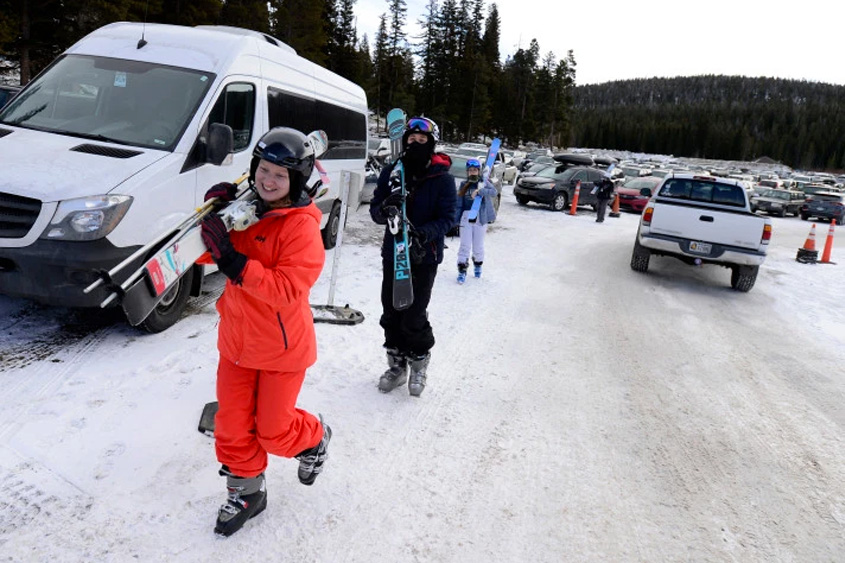Dear County Commissioners,
We write with respect to the proposal to expand private motor vehicle parking capacity at Eldora Mountain Resort. Because the proposal does not meet the standards for special review, and because it would contravene Boulder County’s clear climate commitments, we urge that you deny the proposed expansion. Should you choose to conditionally approve, we urge you to include conditions related to reducing single-occupant vehicle share accessing the site, as recommended by the County Transportation Department. Relevant suggestions are included in the staff memo as “actions the applicant should consider” without being incorporated into the draft conditions of approval. We caution you that approving a parking expansion, especially without requiring serious efforts to reduce peak-period single occupant vehicle mode share, would be a critical error.
Eldora’s proposed parking expansion is a test of our commitment to address the climate crisis, and a chance to act consistently with our stated values. Further, the criteria set forth in the relevant sections of the Boulder County Land Use Code provide a framework for action consistent with our shared values and commitment to protecting public resources and the environment; applying them properly, in our view, would result in a denial of the present application. The fight against climate change is not going to be won or lost on a few grand battlefields. It will be determined by innumerable mundane decisions like the one facing you today, which may seem inconsequential in isolation but are essential components of a comprehensive strategy to combat climate change.
Transportation-related emissions are a major contributor to our regional greenhouse gas emissions problem; expanding parking capacity at Eldora compounds that impact. To stop climate change, we need to start driving less and we need to start yesterday. While some commentary on the parking expansion suggests that adding parking might relieve congestion on local roads and parking lots in Nederland (e.g., the response from the Nederland Fire Protection District), these comments do not reflect the reality, borne out in extensive research and in the experience of numerous communities across the country, that adding parking capacity at key destinations almost universally encourages driving, increases total motor vehicle volumes, reduces incentives to share rides, and exacerbates myriad other traffic-related problems. Simply put, the increased certainty of finding parking (especially free parking) at the end of their trip encourages more people to drive their own cars, rather than carpooling or using public transit. The result is a greater number of vehicles on our public roadways, and a greater number with only one or two occupants, with concomitant negative impacts on local air quality, road congestion and safety, noise disruptions, and general quality of life, in addition to compounding our greenhouse gas emissions.
Given these facts, several portions of the staff memo discussing the relevant criteria for a Special Use application appear disconcertingly incomplete. For instance, there was no meaningful discussion of criterion 6 (whether the proposed use requires greater than available community facilities): the level of current peak-period visitors already outstrips the area’s roadway capacity, raising concerns about emergency response among other critical community services. The proposed expansion makes this problem worse, not better. Staff mentions, almost in passing, that the proposal “may result in the need for improvements to the roads to the site.” While the discussion of criterion 7 (transportation impacts) reflects concerns raised by the county’s transportation experts about single-occupancy vehicle volumes to Eldora, the staff recommendations related to this subject (items 4, 5, 6, and 7 in the final list of recommendations) fall well short of resolving those concerns. Perhaps most egregiously, despite the clear connection between transportation-related greenhouse gas emissions and climate change, staff concluded that nearly doubling private motor vehicle volumes at Eldora presented “no detrimental impacts” to the health, safety, or welfare of present or future inhabitants of the county (criterion 10). The climate crisis is a direct result of decades of human failure to adequately assess the long-term negative impacts of projects like this one.
A recreation business predicated on sufficient snowpack should lead the fight against climate change, and indeed Eldora has made excellent steps in this direction by offering free passes for some weekend N buses, and beginning to operate its own shuttle service from the Boulder County Justice Center on peak weekends. Combined, this means there are currently three to four RTD trips and two Eldora-contracted shuttle bus trips (for a total of five to six) providing service from downtown Boulder to Eldora each Saturday and Sunday morning, with a total capacity for around 270 passengers. To put this in perspective, the additional parking spaces Eldora is seeking could accommodate thousands of additional guests every day, arriving in inefficiently packed private vehicles, without seriously supporting any other transportation options for dozens of bus loads of people. Eldora’s partnership with RTD for free bus tickets and contracting for their own additional shuttles from the justice center is an excellent start, but it is clear that the buses that currently head up the canyon every Saturday and Sunday morning are not enough. If RTD is unwilling or unable to run more bus service, there are numerous other transportation providers Eldora could contract with to provide bus service, and other mechanisms to encourage visitors to carpool, rideshare, or visit during non-peak hours. The current proposal does none of these things.
We recognize that expansion of transit service to Eldora is not cheap. However, we submit that this proposal is, at its root, an attempt to address an unsustainable peak period congestion problem by compounding the error, enabling even more single-occupancy vehicles during peak demand times. While Eldora remains wary of charging for parking, as a method of managing peak-period demand it could work well (as well as generate revenue for additional bus service). We recognize that Eldora may want to pursue other mechanisms for managing peak period demand, and we encourage exploring innovative solutions such as bundling the cost of additional bus service into a season pass, so that buses are provided to guests free of charge.
We hope that this letter does not imply that we would like to limit access to Eldora. On the contrary, the more participants there are in winter sports, the more people who have a vested interest in preventing climate change. We just want to ensure that this access uses proven transportation solutions that do not exacerbate climate change.
If this Board is serious about addressing the climate crisis, this parking lot expansion must be denied in favor of other solutions. The time for bold action is now.
Thank you,
Community Cycles Advocacy Committee

